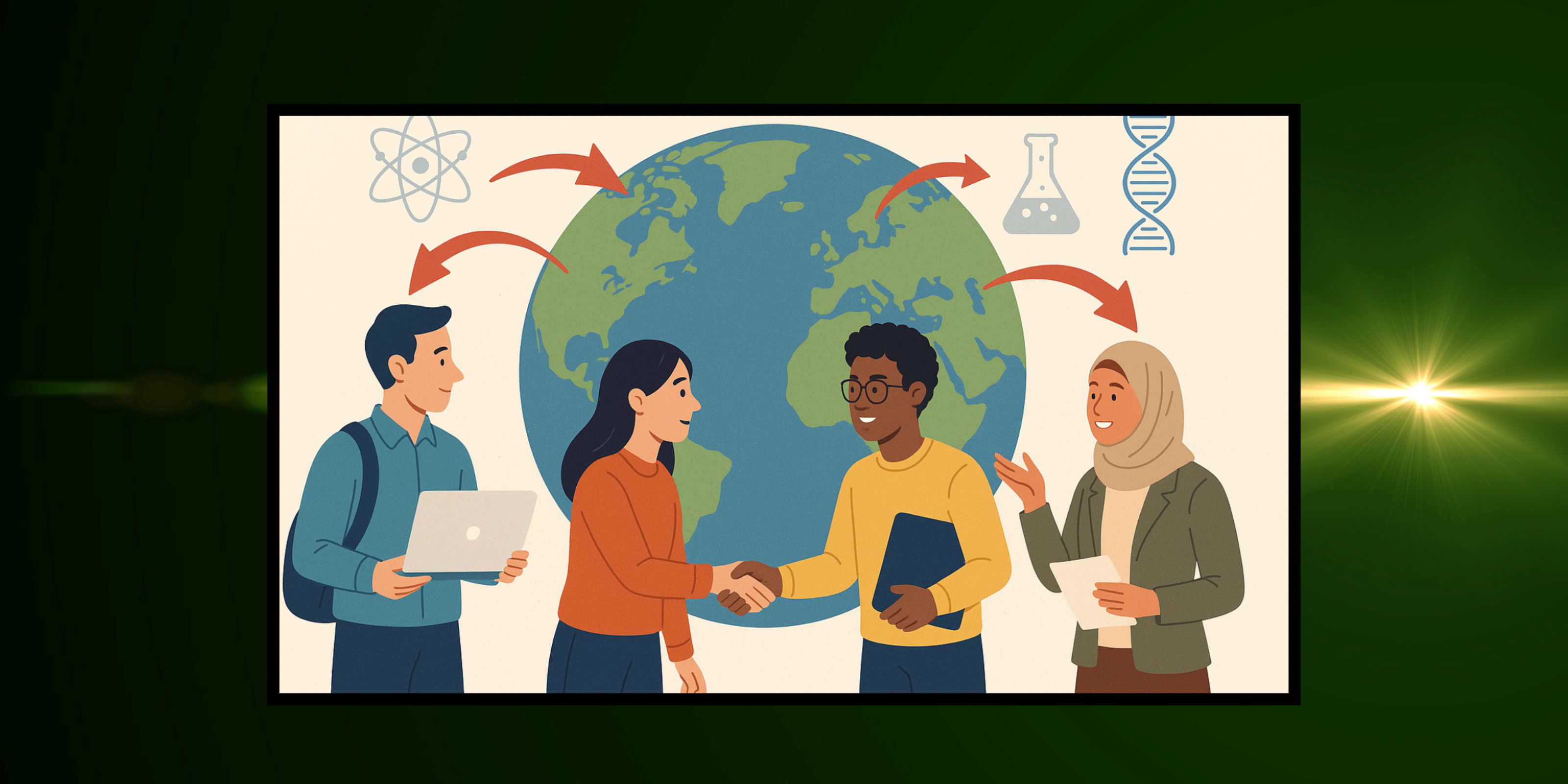Keystone Symposia Aims to Increase Global Impact-- Experts Weigh in on Strategy
By Gillian Dorn & Shannon Weiman
At the annual Board of Directors meeting in January, Keystone Symposia convened a panel of global health experts to discuss how, as a conference organization, we can extend the reach and impact of our conferences to improve human health worldwide. While we already have many initiatives to hold conferences around the world, and to bring scientists from around the world to our conferences, wherever they may be, this panel was brought together to explore our blind spots and identify additional opportunities to make an impact.
The discussion touched on two major themes that align with our overall mission:
- How do we support the science needed to drive advances in global health for populations around the world?
- How do we engage and empower researchers from around the world to drive these advances for their communities?
To answer these questions, we brought in global leaders who have worked extensively across Africa, South America, Asia and beyond to provide their perspectives on the needs of global communities, and how Keystone Symposia might step in to fill some of these gaps.
Panelists included:
- Dr. Peter Hotez, dean for the National School of Tropical Medicine of Baylor College of Medicine, a professor in Pediatrics and molecular virology and microbiology, and an outspoken champion of vaccine science globally.
**See Dr. Hotez's Keynote Address on "Vaccines & Immunizations in a Time of Global Boiling, Megacities & Antiscience" at our upcoming Vaccinology meeting in Washington DC, June 4-7, 2025 -- find out more below! - Dr. Stephen Isaacs, chairman at X-Biotix, a biotechnology company developing new antibiotics for drug-resistant infections, offered industry perspective and insights from his work in Africa.
- Dr. Maria Freire, a biophysicist and native of Peru, formerly directed the Foundation for the National Institutes of Health and shared her experience as a scientist from a low-resource setting coming to the global stage.
- The panel was moderated by former Keystone Symposia CEO Dr. Debbie Johnson, who organized the panel prior to her retirement in July of last year.
Unfortunately, Drs. Kathy Neuzil and Peter Kilmarx were meant to represent Fogarty International Center at the National Institutes of Health but were unable to attend due to communication restrictions imposed by the current administration.

Former CEO, Dr. Debbie Johnson introduces the panel and kicks off the discussion with some background on Keystone Symposia's global health initiatives
Current Global Health Initiatives and Challenges
Current efforts to achieve global impacts include travel awards to bring scientists from low-resource settings around the world to our conferences, as well as hosting conferences in globally accessible countries, including Brazil, South Africa, Ethiopia and more. This year’s HIV Cure: Antiretroviral Therapy-Free Control of HIV Infection meeting will be hosted in Durban, South Africa, while next year’s Tuberculosis meeting will be in Capetown, providing access to world-renowned research leaders to local researchers and communities impacted by these devastating diseases. However, the cost of flying speakers to these locations drives up costs, and therefore extra support from external partners is needed to support this initiative, which currently is funded in part by the Gates Foundation.
Meanwhile, the Global Health Travel Awards program covers the full cost of travel for those from low-resource countries to attend meetings in North America or Europe. These awards are sponsored by The Gates Foundation, the VW Foundation, Glaxo-Smith Klein and endowed gifts, but we are still only able to award only 32-35% of those who apply. It will be important to identify other sources of support for the sustainability and expansion of this program, especially given the rising costs of travel.
For those from low-resource countries who cannot attend, Keystone Symposia provides free access to the On Demand content in order to democratize access to the latest scientific advances. The new CEO, Dr. Jamie Baumgartner, is exploring ways to expand the virtual product to enable more interactive and networking opportunities for those around the globe to participate and glean the value of connecting with scientists around the world.
Building on the eSymposia product, we are exploring how to best translate the quintessential Keystone Symposia experience for global audiences online, in a post-pandemic world where travel is becoming more expensive and also prohibitive due to visa and funding issues.

Dr. Peter Hotez discusses current and evolving global health needs
Evolving Global Health Needs
For decades, global health efforts have focused on curing infectious diseases that are most prevalent in low-resource countries, such as malaria, tuberculosis and HIV. Continuing to address these issues is paramount, said panelists, but there are now additional concerns to add to the docket.
According to Dr. Hotez, we’re entering a new era in global health. As cities grow denser and hotter, due to population growth, urbanization and climate change, people will face new challenges.
We are now seeing a regular cadence of pandemic threats as human populations encroach on the natural world, and when outbreaks do occur, they spread like wildfire due to crowding and increasing globalization. Meanwhile, climate change is driving outbreaks of existing infectious diseases in previously unaffected areas that are unprepared for these issues. For example, cases of dengue fever, malaria, and chikungunya virus are cropping up in the southern U.S.
Altogether these new infectious disease challenges will require better surveillance and diagnostic tools, as well as treatment and public health strategies. This is where Keystone Symposia can play a role in driving advances and facilitating information exchange between communities of scientists around the globe. Indeed, we will be holding our first ever conference on Climate Change & Infectious Disease Threats in Hannover, Germany in June, 2025, and later this year will be hosting a conference on Predicting and Responding to Emerging Viral Infections in Geneva, Switzerland in October, to tackle these challenges.
Dr. Hotez also notes that global health concerns are also expanding well beyond infectious disease. Conditions such as diabetes, cardiovascular disease, depression and anxiety, once considered “western” issues, are on the rise in the global south. In addition, people in low-resource countries are now living longer, resulting in a greater burden of age-related diseases like cancer, with minimal access to treatments that are widely available in the US. Keystone Symposia conferences should incorporate these global perspectives in an effort to better serve populations around the world with these non-communicable diseases, not just those close to home. In this new era, we can open up global health travel awards across broader categories of conferences to help global populations wrestle with these new challenges.

Panelists address gaps in human capital and investments in training globally
Investing in Human Capital
If the first iteration of global health concerned infectious diseases, this new chapter is about disease globalization. To contend with it, we need to empower more countries to care for their local communities and not rely on Western nations to swoop in, said the panelists.
During the COVID-19 pandemic we saw the shortfalls in this approach. Few countries had the technology and expertise to take on vaccine research or production, which limited the speed and reach of vaccine distribution efforts sparking questions about ethical distribution. With new pandemic threats on the horizon, building capacity all over the world is going to be critical, said Dr. Hotez. “That includes health innovation technologies,” he added.
While some countries, including Nigeria, Botswana, and South Africa, are taking action and pouring money into research infrastructure, they don’t have trained individuals to operate these facilities. “You can’t walk into GlaxoSmithKline or Merck or Moderna and say, show me how to build a vaccine,” he added. “We can do it in our [lab], but I think we have to find a way to build that biotechnology training capacity.”
Dr. Isaacs noted the importance of on-the-ground training programs. By supporting initiatives in several African countries during his career, he’s witnessed the impact firsthand. His foundation sponsors a program called the Alliance for Global Health and Science through the Center for Emerging and Neglected Diseases that sends faculty from the University of California, Berkeley to Makerere University in Uganda.
“We teach them how to write grants, we teach them biochemical techniques, we teach them how to apply for travel awards, and it has really worked quite well,” he said. Keystone Symposia could consider using its expertise and connections to field leaders to implement such a training program for scientists in low-resource countries. Indeed we already provide such a program for post-docs and early-career scientists in the US.
“We are more than just a conference company,” Dr. Johnson stated. “Creating a balanced biomedical workforce is fundamental to our mission.”
However, such a program would have to be carefully thought out. Dr. Freire, who came to the U.S. from Peru on a Fullbright Fellowship to study biophysics, pointed out some of the pros and cons of such training programs. “The opportunities I was given in this county, I was never given in my country of origin,” she said, noting the importance of leaving Peru to get the training she needed to launch her now illustrious career. While she had planned to return to Peru with her new knowledge and training to give back to her community, her plans were disrupted by a military coup and she remained in the US. It is not uncommon for students to remain in more resourced countries after their training for various reasons like this, according to Dr. Freire. She and her colleagues in similar situations have found ways to help out back at home, but it is not the same and the dynamic is complicated.
If these training programs simply remove talented and capable individuals from their home countries, where they are most needed, are they really doing very much good? The panelists agreed that it is important to combine training programs abroad with bringing training to those who need it, to avoid a ‘brain drain’ on these nations.

Dr. Maria Friere recounts her experiences as a scientist from Peru

Board Member Dr. Cherie Butts asks the panel a question about how to best serve global health needs
Moving Forward
Overall, the challenges outlined for global health in this new era are opportunities where Keystone Symposia can step in to make a difference. Whether building on existing programs or re-envisioning new roles, we are enthusiastic to serve these communities as best we can, particularly in the face of new challenges that have arisen since this panel was held. However, to do so will require significant investments beyond current resources. To move forward we will need to identify like-minded parties, whether foundations, individuals, or corporations, to initiate collaborations and partnerships that will enable these efforts. Stay tuned as we explore new avenues to advance global health!
If you have any ideas for leads to support Global Health Initiatives, please contact Minda Mason: mindaM@Keystonesymposia.org

Panelists discuss the outcomes and how Keystone Symposia can help with CEO Dr. Jamie Baumgartner

Board members Drs. Peggy Goodell and Cherie Butts thank Dr. Peter Hotez for his insights

Board members Drs. Veronique Kramer and Cherie Butts build on the conversation about what Keystone Symposia can do to impact global health in the future
See Dr. Peter Hotez's Keynote Address:
"Vaccines & Immunizations in a Time of Global Boiling, Megacities & Antiscience"
Vaccinology: Horizons Across Disease, Demography and Technology Washington D.C. , June 4-7, 2025
Early Registration Deadline: April 16, 2025
Poster Abstract Deadline: May 14, 2025
Meet the Author

Gillian Dohrn

Related news
Celebrating Excellence: Scholarships & Global Travel Award Winners in the 2025 Conference Season
In June, Keystone Symposia's 2025 conference season concluded. Altogether, the nonprofit...
Keypoint Newsletter: September 2024
Infectious Disease 2026: From Emerging Threats to Transformative Solutions
Infectious diseases continue to shape human health on a global scale, from sudden outbreaks that...




.png)
